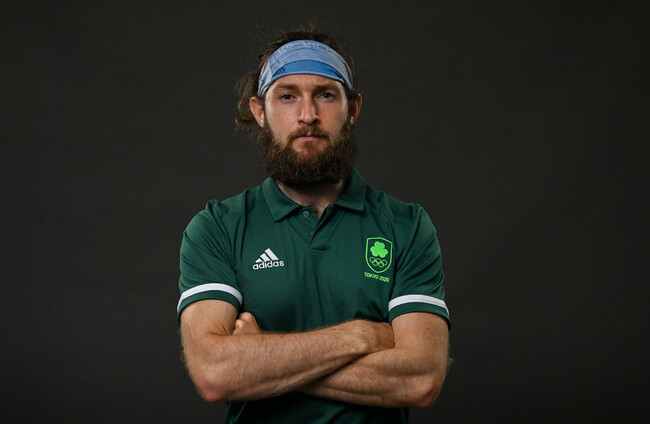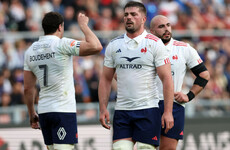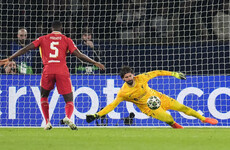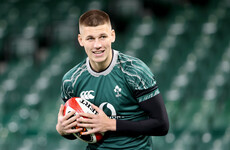ALL THAT GLITTERS is not gold.
Paul O’Donovan has had the luxury of learning as much only by draping plenty of it around his neck since he and his older brother Gary exploded into the public consciousness, both in Ireland and further afield, five years ago.
Gold in the single sculls at the World Championships in 2016. Same again a year later. Gold in the lightweight double sculls in 2018. Same again a year later. Two more golds in the Europeans, both in the lightweight doubles.
You don’t even need to add his Rio Olympic silver or his countless other titles to the equation to determine that O’Donovan belongs in the pantheon of Irish sporting greats.
Legends generally exist in the past and while O’Donovan continues to add to his own legacy, he has for the most part left the physical evidence of his success in his rear view.
He couldn’t tell you where exactly most of his medals actually are: anything lying around on his desk in his rental accommodation in Cork city, where he studies medicine, he tends to sweep into boxes and drop off at the family home back in Lisheen or in his grandmother’s house with the rest of them; places where they might be cherished more by loved ones than they are by O’Donovan, for whom the gratification of such gongs wears off whereas the everyday joys of his craft never have.
“As a kid when you set out your aspirations, you’re always thinking of winning Olympic gold medals and all this type of thing,” he says. “And every season when you’re planning ahead and setting your goals, you’d be like, ‘The big race is this, and I’d like to win it’ — obviously, you know?
“We’ve done that with all of the World Championships and the Europeans as well, and the same with the last Olympics and this Olympics. We’ve always said we want to try and win the thing.
“But then, like, day to day, that’s not really what’s motivating you.
You’re not getting up every morning thinking, ‘Olympic gold medal — I have to go and win that and if I don’t train hard, I won’t.’ You’d kind of, I dunno, lose your mind if you were thinking that every day. Mostly, what motivates us is just that we enjoy actually training every day — or more often than not, anyway, certainly.
“Then, I suppose, if training is getting a little bit hard, you might be like, ‘Maybe it’ll be worth it in the end if you win an Olympic gold medal.’ If you’re having a tired day or something, maybe… Maybe you might look at that then.” He mulls it over further. “I don’t think I would too often to be honest. You just set it to the back of your mind and get on with things.
“It’s always nice to win medals but I just think… D’you know, I’m not rowing to get a big collection of medals. I’m just rowing because I enjoy it.
I did a bit of thinking earlier in the year when I had a bit of time and even my experience of winning the Europeans or the World Championships, or even the last Olympic medal: really, there’s a ceiling on how happy you can be, winning medals. For me, anyway, I don’t think it’s that much above kind of random things that happen and make you happy.
“If I really didn’t enjoy rowing and just found it so hard and miserable — day in, day out, every training, if I just wasn’t enjoying it — then knowing the experience I’ve had winning medals, I don’t think it’d be worth that.
For me, certainly, as long as I’m enjoying the day-to-day stuff — the training and hanging out with the lads — then, the medals are a nice bonus on top of that if you can win some of them. But really, if you’re not enjoying the rest of the stuff, I don’t think it’s worthwhile to go chasing Olympic gold medals.
“…Maybe it’s different for other people,” he adds.
In keeping with that perspective, O’Donovan refers to the Tokyo Olympics at least once as “the Japan regatta”, scarcely a means of diminishing it but more so a means of further contextualising it as simply the next goal, not the be-all and end-all.
He speaks from Banyoles, a small city in northeastern Catalonia famous for its lake which hosted the 1992 Olympic rowing events, and on which the Irish lightweight double sculls teams are preparing for this summer’s Games just as they have for all major regattas since 2016.
To begin their acclimatisation to Japanese humidity, they have been supplementing some of the natural local warmth with sauna work for extra heat stress. The wind in Banyoles picks up in the afternoons, too, just as it might in Tokyo, although that’s a less pressing concern for Dominic Casey’s charges: “Sure in Inniscarra and Skibbereen, we’re almost blown out of it.”
Older brother Gary is also in Banyoles training with the crew but, barring a disaster for somebody else, he won’t get his own second shot at the Games this summer. O’Donovan will row instead alongside Fintan McCarthy, the 24-year-old Skibbereen native with whom he has conquered Europe and the world in the lightweight sculls since 2019.
It was a decision made based solely on performance. Ultimately, the boat belongs to nobody; it is merely borrowed by the two fastest competitors at a given time and, with Tokyo around the corner, the younger O’Donovan brother and McCarthy were the quickest men on the water.
Everybody involved has always been acutely aware of the methodology behind international selection and so there can be little room for sentiment. Although there is still some room where family is concerned. Kind of.
“I don’t know does it change too much, really,” O’Donovan says. “I know Fintan a long time because he started his rowing in Skibbereen, and ‘erra we’ve been together a couple of years now at this stage.
“We did some trials last March and Fintan came out on top [of Gary], but it was very close between the three of us. Naturally, Gary himself would be very disappointed not to be in the boat. He tried very hard, did a lot of training and basically gave his best shot. And I suppose… D’you know, he is my brother so you’d be kind of just used to rowing with him over the years.
But we’ve always said it to each other, we just want to be in the fastest boat and if I’m not in it or he’s not in it, that’s just the case. I think we spoke enough about it beforehand. Everyone assumed with Rio, ‘Oh, they’re brothers, that’s why they’re in the boat together,’ and we were like, ‘That’s not the case. We just happen to be the fastest two and if someone comes around and beats us, then they get in.’ And then that did happen, so you just have to accept that and get on with it.
“And naturally, I do like trying to win races”, O’Donovan smiles, “so if I can have a faster combination, then I’m probably going to be a bit happier to be in that, to have a better chance of winning those gold medals.
“And I suppose, with Covid now, you could end up with a positive test and someone would have to jump out and then he (Gary) would be the next man to step in. So, he’s a good man to have that could step up to the mark, too. That’s nice to have in the back of your mind, too, if the situation arises — but hopefully it won’t.”
Gary’s absence will mean no direct sequel to the brothers’ iconic post-race interview following their Rio final, although O’Donovan describes this more refined version of himself as “probably more my habitual personality; what I’d resort back to in uncomfortable situations, like talking to people.” There’s “a bit more divilment” in Gary, he adds, “and I kind of bounce off that, then, when we’d be together.”
He’s hardly boring on his own, mind.
When asked how else he expects these Games to differ from the last, O’Donovan, doing his best to fight off a smile, replies without missing a beat:
They say they’re all different in their own way and there was a pre-Socratic philosopher, Heraclitus, who said, ‘A man can never fall in the same river twice.’ I suppose that’s because he’s a different man and the river is always moving as well.
“I’m a bit of a different person going into this Olympics and naturally, themselves being in Tokyo and with Covid, there’ll be a slight bit of difference.”
One way in which the river has certainly moved, though, is that whereas the O’Donovan brothers came in slightly under the radar to take silver in Rio, Paul O’Donovan and Fintan McCarthy are definitively the pair to beat in Tokyo, their 2019 World Championship gold and 2021 European gold preceding them.
But it’s in the face of such fanfare where we learn O’Donovan himself hasn’t changed too much: he almost scoffs at it, once more refusing to read too much into past success when there is future success still to be earned.
“I don’t think it makes a massive difference for us to be honest, like. Ah, none at all, really.
“We’re not here doing this rowing thing to change people’s opinions about us and we’re not worried about what people think. We’re doing it for ourselves and want to get the most out of ourselves.
I suppose our goal is to just go as fast as we can and if we can win the gold medal, then, that’s great, and if we don’t but we still gave it our best shot, then we’ll be kind of happy with that, ultimately. I wouldn’t pay heed to this kind of ‘favourites’ and ‘pressure’ type of stuff. I think it’s a bit more made up than anything… But maybe it does affect some people.
He expects to be back working in Cork University Hospital in September and wants to compete at the World Championships in Shanghai in October when the lightweight double scull will be included among the events due to 2021 originally being a non-Olympic year.
He sounds equally enthusiastic, however, about competing at the national championships on the third weekend of August, just three weeks after the Olympics.
“Once this Japan regatta is over with, that’ll be the big one, then.”
















Great article. I’m not hugely interested in sport, but I think that Paul shows a balance and philosophy which are aspirational for living a contented life. He works hard, but that is made easier because he loves what he is doing. And he hasn’t lost sight of the fact that it can be the smaller things in life which ultimately, bring happiness. A very impressive sportsman.